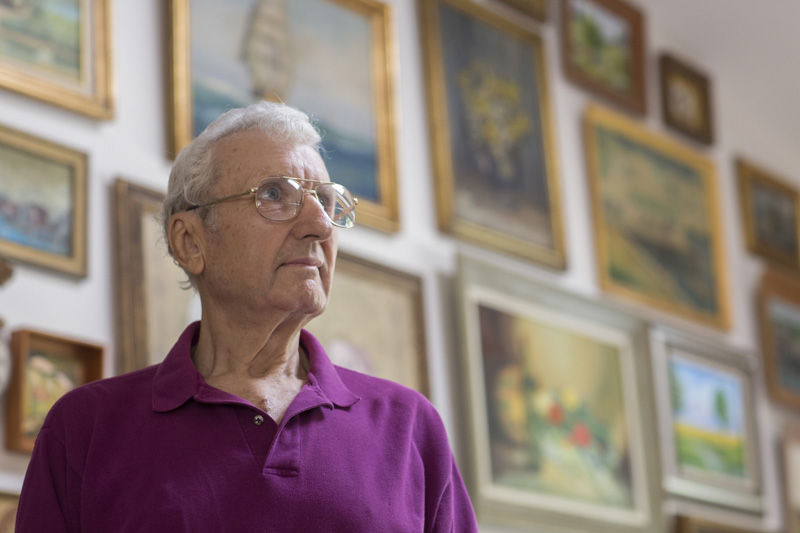What you don’t know really can hurt you. Especially when it comes to your heart’s health.
Ernst Furnsinn, the former owner of Vero’s PV Martin’s restaurant, found that out the hard way. He also lived to learn from it.
Furnsinn says he has lived “a healthy lifestyle” since selling the popular oceanfront restaurant some 13 years ago, taking daily bicycle rides of between 20 and 25 miles.
Despite that impressive exercise regimen, he found out in late February that he needed quadruple bypass surgery. That’s not news anybody wants to hear, let alone a man who just turned 75 a month earlier.
So how does a seemingly healthy and athletic senior suddenly go from marathon-length bike rides to a quadruple bypass?
For the most part, Furnsinn can blame Gregor Mendel.
Well, maybe not the mid-1800s Augustinian friar himself, but rather, the field of science Mendel pioneered: genetics.
Dr. Seth Baker, cardiologist at Indian River Medical Center since 1998 explains: “For the past two decades, there has been so much research and so many clinical studies done on heart disease . . . yet the heritability of coronary disease remains largely unknown. There is no one test or genetic panel that (accurately) predicts risk for heart disease.”
That is, no one can (yet) predict any individual’s likelihood of inheriting the genes that will make him or her predisposed to coronary artery disease or, for that matter, most other diseases. Physicians like Baker certainly wish such predictions were possible but he admits, “We haven’t got a crystal ball or even a magic wand.”
Still, genetics definitely do play a role according to Baker. Some people can consume high-fat, high-cholesterol foods on a regular basis and never have a heart problem. Others must watch what they eat as if their life depended on it because, frankly, it does.
According to the Centers for Disease Control about 715,000 people in the United States will have a heart attack this year brought on by coronary artery disease and more 385,000 will die from the disease. Almost two-thirds of the women and half the men who die suddenly from coronary artery disease will be taken by surprise, just like Ernst Furnsinn, having shown no previous symptoms.
Baker, a huge advocate of preventative medicine and early detection, says that the day-to-day reality here in Vero Beach is that a large portion of the patients he sees already have some degree of coronary artery disease but that it’s not always easy to detect.
Furnsinn, for example, certainly appeared to be in great shape. Inside his arteries, however, thanks to the genes he inherited, cholesterol and plague were busily blocking the flow of blood to his heart.
Then, as Furnsinn explains, “On February 24th I felt a light pressure in my chest and went immediately to the emergency room at IRMC.” The Austrian native goes on to explain that, “three hours later I found out I needed a quadruple by-pass operation. All four arteries had a 90 percent blockage.”
Had he done what so many others do and ignored that “light pressure” in his chest, the popular restaurateur might not be here to tell his tale. But he is actively, almost feverishly, telling that tale now.
Furnsinn started by “writing to some 35 relatives, friends and former employees” to let them know that just having an annual physical isn’t enough to detect heart disease. He had thought it was and that thought almost cost him his life.
Still speaking with his Austrian accent, Furnsinn goes on to say, “I’d been in this country 49 years. Never got sick, never missed a day’s work. You can imagine how shocked I was when I heard the news that I needed such an operation.”
Now he’s spreading the word about genetic predispositions and Baker couldn’t be happier to have one more voice on the subject out there.
The flip side of this, says Baker, is that many patients, including ones with far more obvious signs of artery disease than Furnsinn had, will resist any kind of preventative treatment.
Some physicians might have seen Furnsinn’s relatively high 230 cholesterol level and tried to start him on a course of statins to lower that number. But according to Baker, many people refuse that course of action and even come up with some novel – if not necessarily medically valid – excuses, including the claim that “statins cause tennis elbow.” (They don’t.)
Other doctors might have ordered a stress test but even that, according to Baker isn’t a panacea. “You’d like to think a stress test would reveal coronary disease,” he explains, “but that’s not always the case.”
Every individual patient, says Baker, is just that: an individual. Some patients’ genetic makeup allows fat, plaque and cholesterol to pass through their arteries with ease while other patients’ arteries will allow those substances to attach to the artery walls and begin blocking the flow of blood.
Perhaps the wisest course of action is extend the conversation with your primary care physician and if a first stage relative, (father, mother, sister or brother), has been diagnosed with heart disease, consult a cardiologist, too.
And, of course, as Furnsinn did, at the first sign of any symptom such as his “light pressure in the chest,” shortness of breath, palpitations, irregular heartbeats, skipped beats, a “flip-flop” feeling in the chest, weakness or dizziness, nausea or sweating, always, always, always seek immediate medical help.

